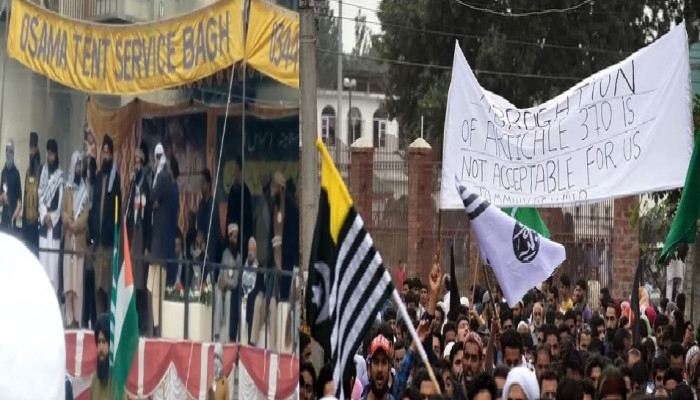Hamas Presence in POK Exposes Pakistan’s Terrorism Agenda
- In Military & Strategic Affairs
- 01:19 PM, Feb 08, 2025
- Ramaharitha Pusarla
In January 2023, EAM Jaishankar, in an interview with Austrian media ORF, called Pakistan an “epicentre of terrorism”. When asked about such a “not very diplomatic” term, Jaishankar replied, “Because you are a diplomat, it doesn’t mean you’re untruthful. I could use much harsher words than epicentre, believe me, considering what has been happening to us, I think epicentre is a very diplomatic word”. New India under the leadership of PM Modi has been equivocal in calling out the state sponsor of terrorism for what it is.
The unabated cross-border terror attacks seeped in “bleed India with thousand cuts” or Ghazwa-e-Hind modus operandi, the defining statecraft of Pakistan is a constant reminder of Pakistan’s international repute as a global terror factory. Grappling with domestic unrest over rising inflation, unemployment, economic recession and eroding people’s trust in the Army, Pakistan has used the February 5, Kashmir Solidarity Day to reignite anti-India sentiment and boost its terror recruitment by organising a mega terrorist conference.
The event on February 5th held at Rawalkot in Pakistan Occupied Kashmir (POK), titled “Kashmir Solidarity and Hamas Operation ‘Al Aqsa Flood Conference” marked the coming together of Mujahideens of Palestine and jihadis of Pakistan. The conference was attended by a representative of Hamas in Iran Dr Khalid Qaddoumi, Hamas leaders Dr Naji Zaheer, Mufti Azam and Bilal Alsallat, JeM’s leader Talha Saif, brother of Masood Azhar, commanders Asghar Khan Kashmiri, Masood Ilyas and top LeT leaders. As per some reports, Hafiz Talha Saeed son of Hafiz Saeed made provocative statements with religious overtones from the same platform- “I want to warn PM Modi that Kashmir belongs to Muslims, and we will take Kashmir from you. It will be a part of Pakistan Muslim India soon”.
The viral videos of warm embraces, red-carpet welcomes, gun salutes and horse-riding rallies commemorating the presence of Hamas leaders on social media though labelled as a “narrative-building exercise” have deeper undertones to them. Meanwhile, allaying concerns a Pakistani analyst alluded that Hamas participated in the conference “for solidarity with the Kashmir cause, as Hamas believes that the cause of Gaza and Kashmir is one”. He argued that Pakistan’s invitation to Hamas to the conference is part of its strategy to strengthen ties with Iran after both countries ruffled feathers over Balochistan and Iran’s interference in Islamabad’s internal affairs. But this sugar-coated commentary lay bust with Jaish leaders proclaiming that they are all together in fighting for Kashmir.
The potential collaboration between Pakistani terror groups and Hamas was orchestrated by ISI which tapped into Hamas' angst with India for condemning the October 7 terror attack on Israeli civilians. India always backed the two-state solution for Israel and supported Palestine's self-determination. But Hamas refuses to recognise the state of Israel and hasn’t been a genuine representative of Palestinian aspirations.
Though Hamas has created an illusion of a messiah of Palestinian aspirations, it is inspired by the Muslim Brotherhood, an Islamic resistance movement. Hamas Charter openly calls for the destruction of Israel and weaponises terrorism. By sharing the stage with Pakistani terrorist commanders, Hamas openly backed the Kashmir cause.
Hamas representative Khalid Qaddoumi also met hardline Islamist leader, Maulana Fazlur Rahman leader of Jamiat Ulama-e-Islam, who played the role of Pakistani ambassador to Palestine and met Hamas leader Khaled Meshaal and Ismail Haniyeh in Qatar after the October 7 terror attack.
In his conversation, Haniyeh said, “The Palestine and Kashmir issues had been a litmus test for advocates of human rights” and indicated that all the Islamists must unite in support of Palestine and Kashmir. The Pan-Islamist terrorist congregation at POK is thus a “convergence of terrorist groups with differing but overlapping agendas”.
Firmly backing the event staged by ISI, Pakistan's Prime Minister also travelled to POK to address a special session of assembly at Muzaffarabad where he racked up the Kashmir issue. “India should come out of the thinking of August 5, 2019, and fulfil promises made to the UN and launch a dialogue” and added, “We want all issues, including Kashmir, to be resolved through talks.” But the pretence of peace overture fell flat with reports emerging that Indian security forces had foiled an ambush by Pakistani infiltrators along the LoC on February 5. This operation resulted in the elimination of seven Pakistani infiltrators and three Pakistan Border Action Team (BAT) personnel.
The Director Generals of Military Operations of India and Pakistan have reached an understanding on a ceasefire in February 2021. But there was no respite for India from cross-border escalations as Pakistan violated the ceasefire with impunity. However, there was a noticeable improvement in the security situation in J&K after the abrogation of Article 370 as local recruitment almost dried up. With India stepping up vigilance, Pakistani jihadists had to infiltrate to disrupt the peace in the valley.
While J&K is returning to the path of development, Pakistan is facing stiff protests in Pakistan Occupied Kashmir, insurgent attacks intensified in Balochistan and its frontier provinces are severely caught up in the cross-border fighting with TTP. Indeed, to counter the TTP, Pakistan is shifting its machinery from LoC to the Northern frontier to take on TTP.
The presence of Hamas representatives is an attempt to reactivate cadres and boost the radicalisation and recruitment cycle, the cannon fodder of Pakistan’s terrorism machinery. India is closely monitoring Pakistan’s attempts to revive the terrorist network. By bringing Hamas into its fold, Pakistan intends to internationalise the Kashmir issue once again.
As a matter of temporal coincidence, Home Minister Amit Shah in line with India’s zero-tolerance stance to combat terrorism held a high-level meeting in Srinagar and launched a two-pronged strategy. This includes- economically suppressing the terror network through an effective crackdown on drug trafficking through total disassembly of the narcotic distribution system and intensifying cooperation between multiple security agencies. Modi government adopted an uncompromising stance- talks and terror can’t go together and resolutely adhered to it.
Colluding with the Islamist network in Bangladesh while Pakistan is creating unrest on India’s eastern frontier, India upped the game by resetting ties with Afghanistan and stepping up bilateral engagement with the Afghan Taliban. But the Hamas presence is something New Delhi can’t ignore considering Trump’s plan to ‘clean out Gaza’. Trump’s latest proposal to take over Gaza and Netanyahu’s acquiescence to the same has huge indirect ramifications for India as well.
Pakistan has been a natural magnet for the Islamic terrorists and jihadi groups. As a state sponsor of terror, Pakistan allied with different terrorist organisations including ISIS for its national interests. US takeover of Gaza will force eviction of the highly radicalised Hamas cadres. Keen on utilising Hamas' terror warfare skills, Pakistan might be more than willing to shelter the Palestine mujahideen.
Besides, some radical Islamic groups in India have their sympathies with Hamas. Indeed, the Solidarity Youth Movement, the youth wing of Jamaat-e-Islami organised a rally which had a tagline of “Uproot Bulldozer Hindutva and Apartheid Zionism”. Former Hamas chief, Khaled Mashaal virtually attended the rally. The event glorified terrorists under the guise of Saving Palestine.
Pakistan and terrorism are inseparable. With an undeniable record of nurturing, funding and leveraging terrorism, Pakistan has positioned itself as a global fount of terrorism. Hamas’ entry into South Asia will certainly change the security dynamics of the region and India must adeptly pull out yet another surgical strike if the situation so warrants. Simultaneously, India must also build a case to designate Hamas as a terror organisation should things come to bear.
Disclaimer: The opinions expressed within this article are the personal opinions of the author. MyIndMakers is not responsible for the accuracy, completeness, suitability, or validity of any information on this article. All information is provided on an as-is basis. The information, facts or opinions appearing in the article do not reflect the views of MyindMakers and it does not assume any responsibility or liability for the same.







Comments